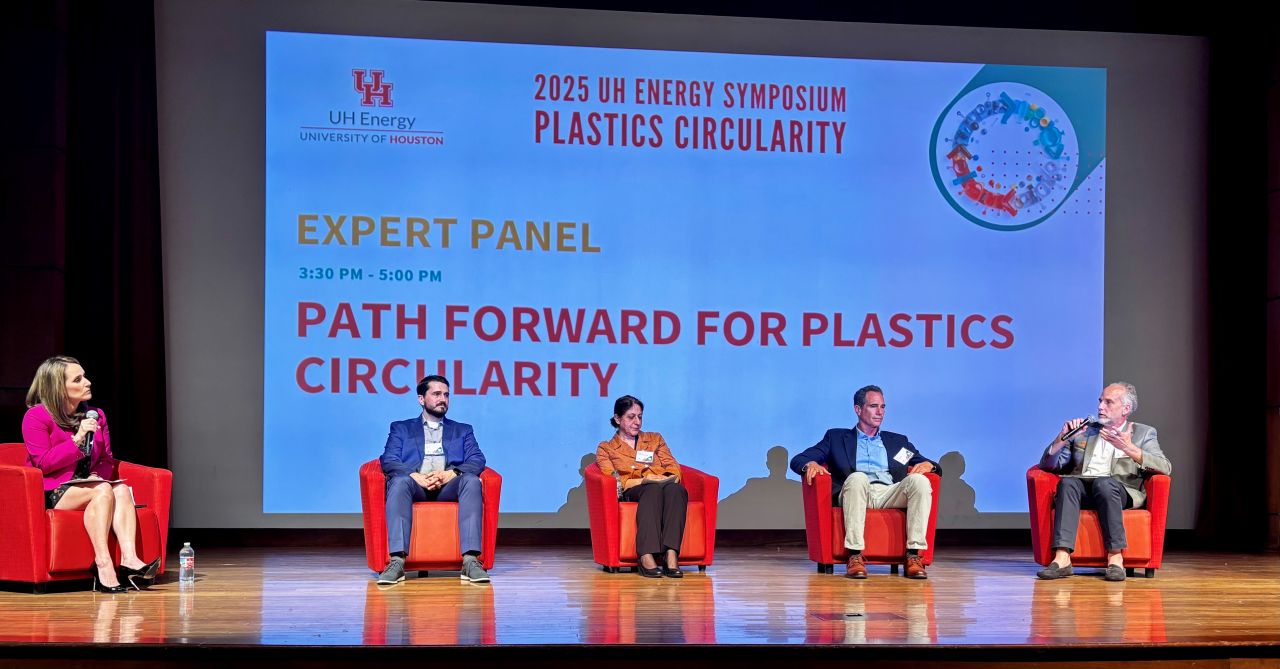
Plastics circularity continues to dominate global conversations as industries confront the mounting challenge of plastic waste and its long-term impact on the environment. The University of Houston—a key hub for energy and chemical innovation—hosted their annual Energy Symposium on Plastics Circularity, inviting industry professionals and leaders to explore this complex issue and the opportunities it presents.
“Plastics waste is a global societal challenge, and the unmanaged plastic waste issue threatens the quality of life worldwide,” said Ramanan Krishnamoorti, Vice President of the Division of Energy & Innovation. “Houston stands at the center of innovation in the making and using of plastics and must take on the challenge of addressing the issues surrounding plastic waste.”
The symposium featured a dynamic panel discussion and engaging dialogue around current gaps in the plastics value chain and the need for a holistic systems approach. The Expert Panel included Andrew Oliver, Technology Manager for Sustainable Feedstocks at the Dow Chemical Company; Meltem Urgun Demirtas, Department Manager for Sustainable Materials and Processes at Argonne National Laboratory; Jace Tunnell, Director of Community Engagement at Harte Research Institute, Texas A&M Corpus Christi; and Helmut Brenner, ESG manager at Shell Polymers.
Andrew Oliver opened with insights on the need for new materials sourcing and recycling solutions. “Technology is going to be the way that we address all these issues,” he said. “There needs to be some development of AI and additional technology to help make sure that the right plastics go to the right sources.”
Oliver cited Dow’s partnership with Mura Technology, which converts recycled plastic
waste into feedstock for new polymers, as a key example of how industry can implement
real change through collaboration.
Meltem Urgun Demirtas emphasized the importance of systemic thinking and the role
of science in shaping sustainable material flows. “Unlike linear economy, multiple
driving forces need to be considered to accelerate the circular economy around plastic
materials,” Demirtas said. “We shouldn't just focus on what we are doing. If I am
involved in emerging processes of those plastic waste streams, I need to consider
separation or sorting efficiency and how to improve these to impact my process. Or
if I'm developing circular materials or chemicals, how those are going to be received
or disposed by using the conventional waste management processes?”
Citizen science and community engagement also took the spotlight with Jace Tunnell highlighting grassroots initiatives such as Nurdle Patrol, which tracks microplastics in waterways. His video series Beachcombing adds a human and ecological dimension to the plastics narrative.
Helmut Brenner, ESG Manager at Shell Polymers, spoke candidly about the disconnect between market mechanisms and the urgency of the plastics crisis. “We have to move as a species away from traditional extractive processes into a more sustainable future,” Brenner said. “The problem still exists, and unless it’s dealt with, we will pay the price—or worse, our children will pay the price.”
He noted the lack of federal policy around plastics in the U.S. and stressed the need for stronger regulatory frameworks to complement industry initiatives.
The symposium concluded with a celebration of student and community creativity through art and poster competitions that explored themes of waste, consumption, and environmental impact.
Art Competition Winners:
1st: Morgan Turner – Progression
2nd: Yaridka Turrubiartes – The Ocean’s New Menu
3rd: Angela Sanchez – Wings of Circularity
Special Mentions:
Tiffany Colston – You Are What You Eat
Raizelle Lee – Just a Plastic Bag
Kevin Trujillo – Bottle of Man
Poster Competition Winners:
1st: Nagesh Ramaswamy (Poster #5)
2nd: Diana Cousins (Poster #11)
3rd: Amna Afzal (Poster #4)
Special Mentions:
Poster #6: Sadashiva
Poster #3: Ronard
Poster #19: Muhamad Arslan
The UH Energy Symposium on Plastics Circularity demonstrated the multifaceted approach needed to address plastic pollution and promote sustainability. From scientific research and corporate initiatives to community education and artistic expression, this event highlighted the diverse efforts being made to create a more circular economy for plastics.